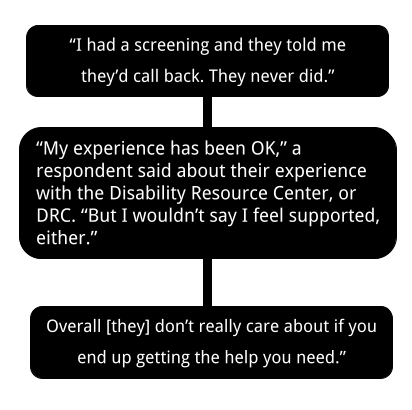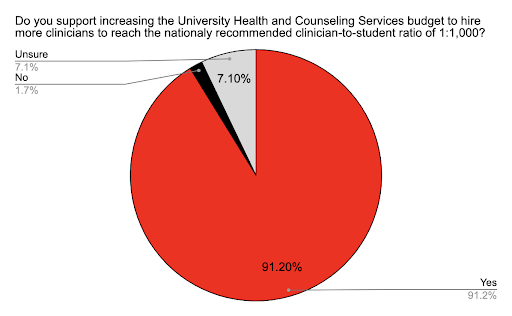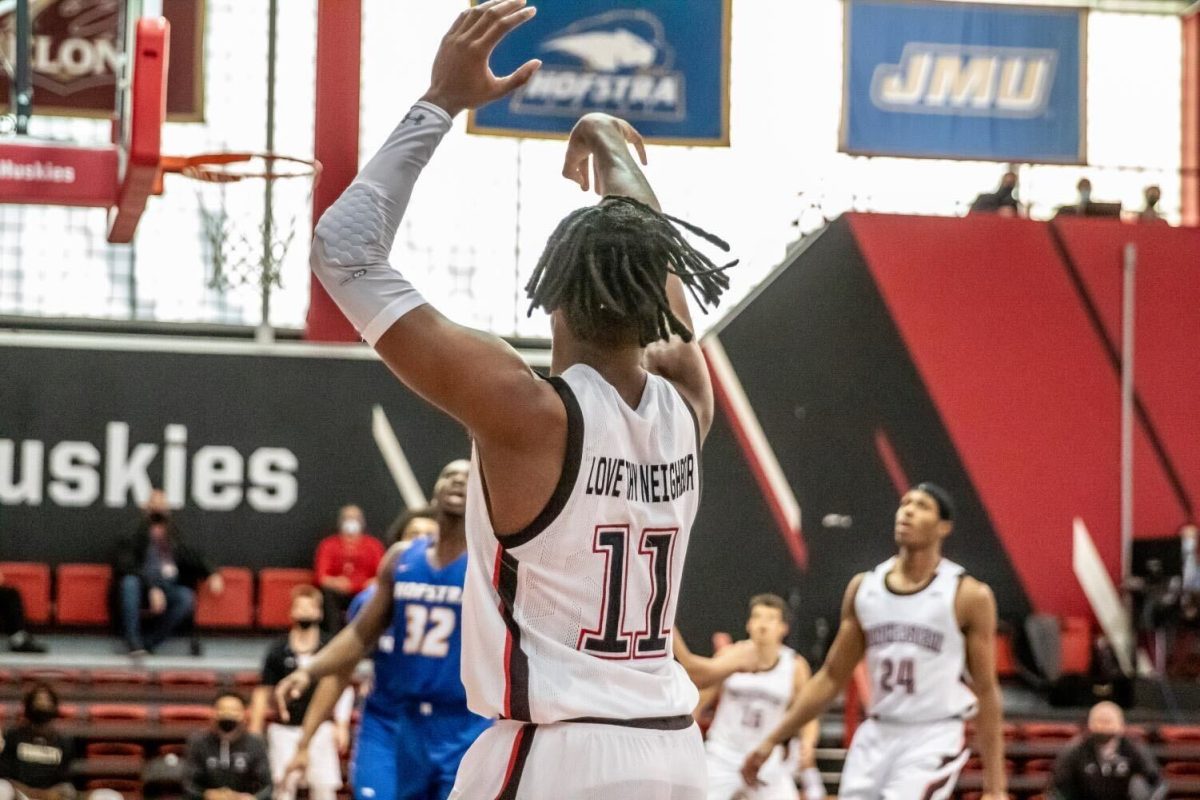‘Do not come to me with any mental health issues’: The issue of mental health resources at Northeastern
July 5, 2023
Northeastern students say they are burnt out, anxious and isolated — and the school is struggling to support them. With the CDC announcing the end of the Federal COVID-19 Public Health Emergency, many believe mental health issues are less of a concern. However, this may be a misconception, especially at universities in the United States. Students are found to have poorer mental health than the general population, and university resources are overwhelmed with the student-to-counselor ratio, making students feel there is a lack of information about available resources.
According to the Suicide Prevention Resource Center, one in five college students experience a mental health condition. Mental Health America found students facing mental health struggles often aren’t able to get support from their school institutions as “many colleges and universities are woefully unprepared and under-resourced.” The lack of resources — such as counseling services, peer support programs, disability support services and mental health education — has resulted in students struggling to receive adequate help “to navigate their recovery and succeed in school.”
In an anonymous, non-scientific survey conducted in March of 25 people, students shared their experiences with Northeastern’s mental health resources.
“I think the limited availability of counseling definitely takes away from all the mental health awareness Northeastern is trying to uphold,” one student shared. “Having available resources at your fingertips is much more convenient and important towards resolving issues than having it limited to a certain amount.”
Other students who participated in the survey agreed.

Active Minds, a student-run chapter of a mental health advocacy and education non-profit, found in a March 2022 survey of 758 students that only 30% had used on-campus mental health care. Those that did use the resources ranked their satisfaction as low, with an average of 2.12 out of 5 and more than 65% saying they wouldn’t recommend on-campus mental health resources to others.
Behind the SMILE (Suicide and Mental Illness Education), a student organization on campus, noted in a 2017 article that the University Health and Counseling Services (UHCS) counseling center does not have enough behavioral health clinicians for the student population. Behind the SMILE states that there are nine clinicians for all 18,000 undergraduate students. The Active Minds survey showed 91.2% said “yes” to supporting the increase of “University Health Counseling Services budget to hire more clinicians to reach the nationally recommended clinician-to-student ratio of 1:1,000.”
Northeastern works with an outside staff of licensed mental health clinicians to provide Find@Northeastern to students 24/7, which Christine Civiletto, vice chancellor for wellness and licensed psychologist, said works to offset the low student-to-counselor ratio.

“It’s a little misleading for us to look and say that our students here in Boston only have access to the x number of clinicians that we have at UHCS, because they have access to us and then all of those other clinicians,” Civiletto said. “So it’s a little more nuanced, I think, than just a straight 1 to 1000 that you might have at a university that doesn’t have that additional access to all those unlimited free sessions through the network.”
Erin Harrington, a second-year psychology major, shared her experience accessing accommodations for a mental health diagnosis with Northeastern’s Disability Resource Center (DRC). She recalled frustration that despite having approval from her doctor, she still had to explain herself and her symptoms in order to get what she needed from the DRC.
Many student organizations are attempting to fill the gaps that students find Northeastern has neglected. Charlie Zhang, a third-year international business and sociology combined major and incoming president of Student Government Association, or SGA, was involved in creating the Holistic Wellness Working Group. The Holistic Wellness Working Group is composed of representatives from student clubs and the university’s administration. Its goal is to provide a space for open dialogue between the school and its students.
“In the future, we have to look towards methods that encompass everybody,” Zhang said. “It’s not an easy equation to solve and it’s not something that I think is a short term solution.”
Daniel Huber, a third-year chemical engineering major and director of marketing at Active Minds, said the club’s current focus is to improve the wellness days program for students, and then address the issues with UHCS.
“I think a big issue is UHCS doesn’t have the capacity to help all the students,” Huber said.
Civiletto acknowledged that spreading awareness of campus resources is an ongoing challenge for the university.
“We’ve tried a number of different ways to get information out, but what we’re hearing from students … is that at some point, students kind of tune out the posters and the messaging that is more traditional around campus, but they really are receiving it very well from peers,” she said. “Partnering with student groups and really hearing from them how their colleagues or their classmates are most open to hearing the information is kind of our newer focus.”
UHCS’ inability to provide sufficient support to students is especially problematic since studies show mental health problems are rising among college students.
“Rising rates of anxiety, stress, depression, suicide is kind of affecting us everywhere. You might say it’s an epidemic,” Zhang said.
In an interview with BU Today last September, Sarah Lipson, the principal investigator of Healthy Minds Network for Research on Adolescent and Young Adult Mental Health, said “the college mental health ‘crisis,’ as many refer to it, is not just a crisis of prevalence, it’s also a crisis defined by significant levels of unmet mental health needs and inequalities in terms of who is able to access service and treatment.” Lipson found that the first signs and symptoms of mental health problems most commonly emerge during college years, between the ages of 18 and 25.
 Students who filled out the anonymous, non-scientific survey contributed ideas on how this issue might be combatted.
Students who filled out the anonymous, non-scientific survey contributed ideas on how this issue might be combatted.
“More workshops should be held with professors on mental health. My orgo teacher’s syllabus states in bold ‘do not come to me with any mental health issues,’” one respondent said in the survey.
“I think the limited availability of counseling definitely takes away from all the mental health awareness Northeastern is trying to uphold,” wrote another. “Having available resources at your fingertips is much more convenient and important towards resolving issues.”
Some students are trying to support the university in providing more access and resources to their students. Nita Akoh, a fourth-year behavioral neuroscience major, and Aarti Sathyanarayana, assistant professor at the Bouvé College of Health Sciences and Khoury College of Computer Sciences, are developing an app called My Atlas to utilize quantitative data to monitor behavioral health.
Akoh moved from Nigeria to the United States after attending high school in Canada, which she said impacted her approach to mental health.
“There needs to be personalized ways to target mental health and also make it more accessible at the same time and I think that’s what My Atlas is really, really geared to,” Akoh said. “I’m making it a low-cost system and that’s why we’re more interested in college campuses in a way that the college can pay for the app and give it to the students for free.”
Matty Coleman, a third-year psychology student, works for a variety of organizations connected to mental health at Northeastern. Coleman is the incoming president of Lean On Me, a student-run confidential warm line and incoming Executive Vice President of SGA. They currently work at McLean Hospital, a leading provider of psychiatric care, research and education.
Coleman said they hope in the future, Northeastern can be more proactive in expanding the resources they currently have.
Northeastern is “very much actively experiencing a crisis in terms of our resource status at the university,” Coleman said. As a result, Coleman believes that since “we’re so in the mud right now, there has to be a reactive end to it, too.”
Civiletto acknowledged the importance of resources to support students’ mental health, as “the majority of mental health concerns really do emerge or show themselves during this period of life,” she said.
The university’s resources are set to grow in partnership with the JED Foundation, the school announced last fall.
“It’s a very intentional partnership between both sides of the university system: The Office of the Chancellor, where I live on the student life side, as well as the Office of the Provost, which is more focused on faculty, teaching, and academics,” Civiletto said. “We have partnership on both sides to really say we need to look at how we’re supporting student mental health, not only by providing direct care and resources after the fact, but looking at how we’re contributing to a system of holistic wellness across the university.”
In the fall of last year, Northeastern Universities Health and Counseling Services (UHCS) office partnered with students in the Student Government Association (SGA) Student Services Committee to produce a condensed list of mental health resources provided by the school to students. This includes Find@Northeastern, UHCS, We Care, Center for Spirituality, Dialogue, and Service (CSDS), and free access to apps like Headspace and SilverCloud. Other offices to note that Northeastern University houses to support students in some way related to mental health is the Disability Resource Center (DRC), Northeastern University Police Department (NUPD), Office of University Equity and Compliance/Title IX, Office of Prevention and Education at Northeastern (OPEN), Student Support Initiative (SSI) and the Learning Disabilities Program (LDP).






